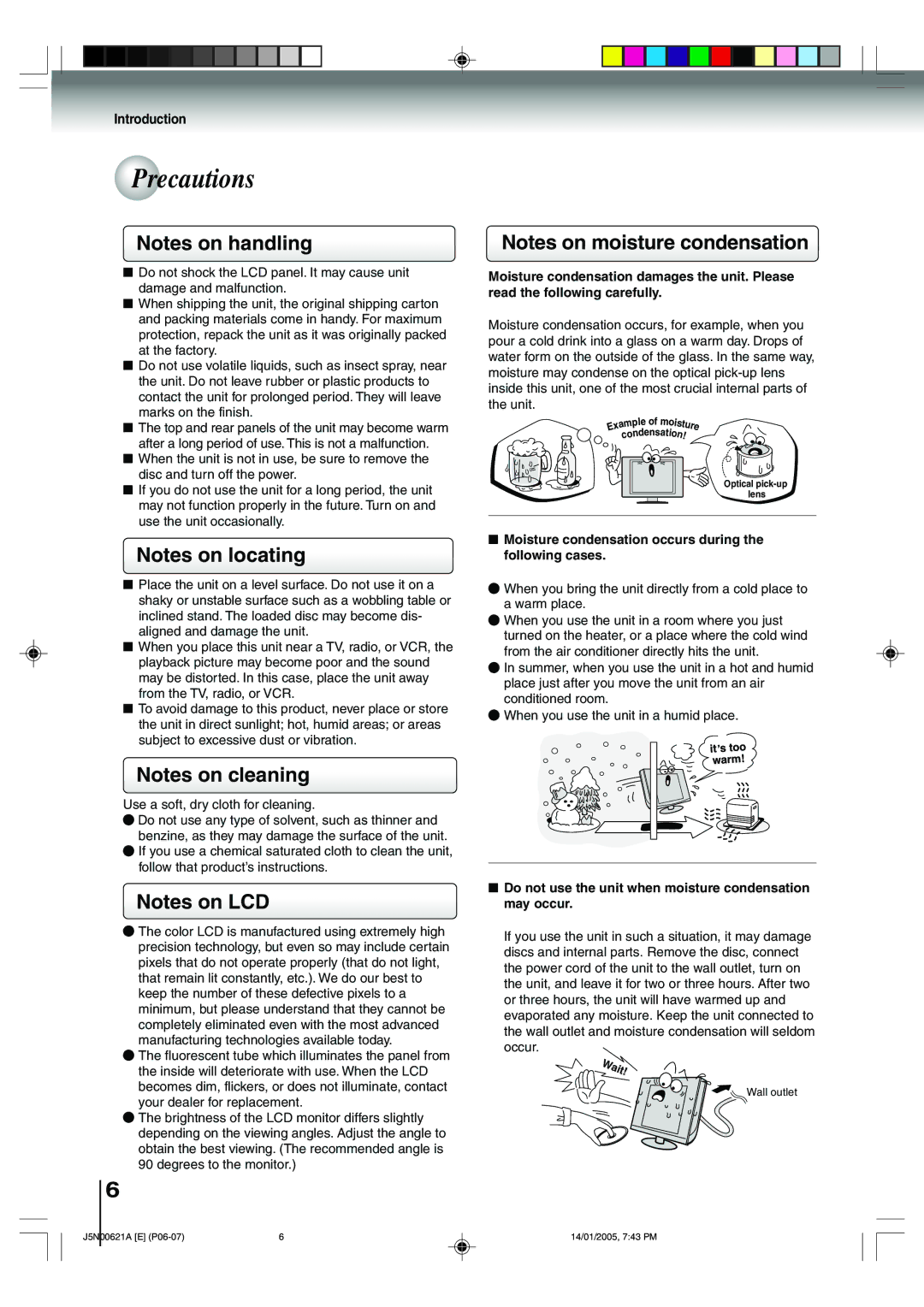
Introduction
Precautions
Notes on handling
■Do not shock the LCD panel. It may cause unit damage and malfunction.
■When shipping the unit, the original shipping carton and packing materials come in handy. For maximum protection, repack the unit as it was originally packed at the factory.
■Do not use volatile liquids, such as insect spray, near the unit. Do not leave rubber or plastic products to contact the unit for prolonged period. They will leave marks on the finish.
■The top and rear panels of the unit may become warm after a long period of use. This is not a malfunction.
■When the unit is not in use, be sure to remove the disc and turn off the power.
■If you do not use the unit for a long period, the unit may not function properly in the future. Turn on and use the unit occasionally.
Notes on locating
■Place the unit on a level surface. Do not use it on a shaky or unstable surface such as a wobbling table or inclined stand. The loaded disc may become dis- aligned and damage the unit.
■When you place this unit near a TV, radio, or VCR, the playback picture may become poor and the sound may be distorted. In this case, place the unit away from the TV, radio, or VCR.
■To avoid damage to this product, never place or store the unit in direct sunlight; hot, humid areas; or areas subject to excessive dust or vibration.
Notes on cleaning
Use a soft, dry cloth for cleaning.
![]() Do not use any type of solvent, such as thinner and benzine, as they may damage the surface of the unit.
Do not use any type of solvent, such as thinner and benzine, as they may damage the surface of the unit. ![]() If you use a chemical saturated cloth to clean the unit, follow that product’s instructions.
If you use a chemical saturated cloth to clean the unit, follow that product’s instructions.
Notes on LCD
![]() The color LCD is manufactured using extremely high precision technology, but even so may include certain pixels that do not operate properly (that do not light, that remain lit constantly, etc.). We do our best to keep the number of these defective pixels to a minimum, but please understand that they cannot be completely eliminated even with the most advanced manufacturing technologies available today.
The color LCD is manufactured using extremely high precision technology, but even so may include certain pixels that do not operate properly (that do not light, that remain lit constantly, etc.). We do our best to keep the number of these defective pixels to a minimum, but please understand that they cannot be completely eliminated even with the most advanced manufacturing technologies available today.
![]() The fluorescent tube which illuminates the panel from the inside will deteriorate with use. When the LCD becomes dim, flickers, or does not illuminate, contact your dealer for replacement.
The fluorescent tube which illuminates the panel from the inside will deteriorate with use. When the LCD becomes dim, flickers, or does not illuminate, contact your dealer for replacement.
![]() The brightness of the LCD monitor differs slightly depending on the viewing angles. Adjust the angle to obtain the best viewing. (The recommended angle is 90 degrees to the monitor.)
The brightness of the LCD monitor differs slightly depending on the viewing angles. Adjust the angle to obtain the best viewing. (The recommended angle is 90 degrees to the monitor.)
6
Notes on moisture condensation
Moisture condensation damages the unit. Please read the following carefully.
Moisture condensation occurs, for example, when you pour a cold drink into a glass on a warm day. Drops of water form on the outside of the glass. In the same way, moisture may condense on the optical
|
|
| le of m | ois |
|
| mp | tu | |||
a |
|
|
| ||
Ex |
|
| e |
| re |
|
| ond nsatio |
| ||
| c |
| n! | ||
Optical
■ Moisture condensation occurs during the following cases.
![]() When you bring the unit directly from a cold place to a warm place.
When you bring the unit directly from a cold place to a warm place.
![]() When you use the unit in a room where you just turned on the heater, or a place where the cold wind from the air conditioner directly hits the unit.
When you use the unit in a room where you just turned on the heater, or a place where the cold wind from the air conditioner directly hits the unit.
![]() In summer, when you use the unit in a hot and humid place just after you move the unit from an air conditioned room.
In summer, when you use the unit in a hot and humid place just after you move the unit from an air conditioned room.
![]() When you use the unit in a humid place.
When you use the unit in a humid place.
■Do not use the unit when moisture condensation may occur.
If you use the unit in such a situation, it may damage discs and internal parts. Remove the disc, connect the power cord of the unit to the wall outlet, turn on the unit, and leave it for two or three hours. After two or three hours, the unit will have warmed up and evaporated any moisture. Keep the unit connected to the wall outlet and moisture condensation will seldom occur.
Wait!
![]() Wall outlet
Wall outlet
J5N00621A [E] | 6 | 14/01/2005, 7:43 PM |
